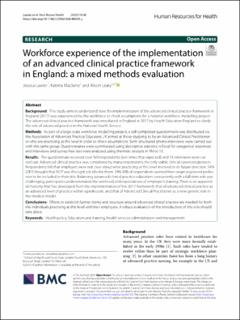| dc.contributor.author | Lawler, Jessica | |
| dc.contributor.author | Maclaine, Katrina | |
| dc.contributor.author | Leary, Alison | |
| dc.date.accessioned | 2021-03-15T10:10:45Z | |
| dc.date.available | 2021-03-15T10:10:45Z | |
| dc.date.created | 2021-01-20T09:37:57Z | |
| dc.date.issued | 2020 | |
| dc.identifier.citation | Lawler, J., Maclaine, K., & Leary, A. (2020). Workforce experience of the implementation of an advanced clinical practice framework in England: a mixed methods evaluation. Human resources for health, 18(1). | en_US |
| dc.identifier.issn | 1478-4491 | |
| dc.identifier.uri | https://hdl.handle.net/11250/2733345 | |
| dc.description.abstract | Background: This study aims to understand how the implementation of the advanced clinical practice framework in England (2017) was experienced by the workforce to check assumptions for a national workforce modelling project. The advanced clinical practice framework was introduced in England in 2017 by Health Education England to clarify the role of advanced practice in the National Health Service. Methods: As part of a large-scale workforce modelling project, a self-completed questionnaire was distributed via the Association of Advanced Practice Educators UK aimed at those studying to be an Advanced Clinical Practitioner or who are practicing at this level in order to check assumptions. Semi-structured phone interviews were carried out with this same group. Questionnaires were summarised using descriptive statistics in Excel for categorical responses and interviews and survey free-text were analysed using thematic analysis in NVivo 10. Results: The questionnaire received over 500 respondents (ten times that expected) and 15 interviews were carried out. Advanced clinical practice was considered by many respondents the only viable clinical career progression. Respondents felt that employers were not clear about what practicing at this level involved or its future direction. 54% (287) thought that ‘ACP’ was the right job title for them. 19% (98) of respondents wanted their origin registered profession to be included in their title. Balancing advanced clinical practice education concurrently with a full-time role was challenging, participants underestimated the workload and expectations of employer’s training. There is an apparent dichotomy that has developed from the implementation of the 2017 framework: that of advanced clinical practice as an advanced level of practice within a profession, and that of Advanced Clinical Practitioner as a new generic role in the medical model. Conclusions: Efforts to establish further clarity and structure around advanced clinical practice are needed for both the individuals practising at this level and their employers. A robust evaluation of the introduction of this role should take place. | en_US |
| dc.language.iso | eng | en_US |
| dc.rights | Navngivelse 4.0 Internasjonal | * |
| dc.rights.uri | http://creativecommons.org/licenses/by/4.0/deed.no | * |
| dc.title | Workforce experience of the implementation of an advanced clinical practice framework in England: a mixed methods evaluation | en_US |
| dc.type | Peer reviewed | en_US |
| dc.type | Journal article | en_US |
| dc.description.version | publishedVersion | en_US |
| dc.rights.holder | © The Author(s). | en_US |
| dc.source.volume | 18 | en_US |
| dc.source.journal | Human Resources for Health | en_US |
| dc.source.issue | 1 | en_US |
| dc.identifier.doi | https://doi.org/10.1186/s12960-020-00539-y | |
| dc.identifier.cristin | 1875119 | |
| dc.source.articlenumber | 96 | en_US |
| cristin.ispublished | true | |
| cristin.fulltext | original | |
| cristin.qualitycode | 1 | |

